外研版高中英语必修三module3教案
- 格式:doc
- 大小:61.00 KB
- 文档页数:5

新外研社版高中英语必修三Unit 3 The World of ScienceStarting out&Understanding ideas教学设计教学目标:By the end of this period, students will be able to:1.Watch a video and extract the key information from it;2.Know and master the main features of an interview;3.Understand this passage to obtain relevant details;4.Improve critical thinking skills and try to give some useful suggestions.教学重难点:1.Summarise the inventions and usage of acquiring language knowledge;2.Understand the future trends in global technology development, form an international perspective, and deepen your understanding of the unit theme.教学方式:P-W-P教学法,Task-based Teaching Method.教学设计:Step ⅠLead-inActivity1Watch a videoWatch the video and answer the questions.1.Which of the inventions in the video interests you most?Why?2.Which of the inventions in the video do you think will become a reality?3.Of all the inventions in the world,which do you think is the most useful? Why?Suggested answers:Students’ own answers.Activity2Look at the picturesLook at the pictures and talk about how the way we live has changed over time.Discuss the reasons behind these changes.Suggested answers:Students’ own answers.Step ⅠWhile-readingActivity1Read for the main ideaChoose the sentences that describe Dr Fairhurst’s opinions.Suggested answers:2,4Activity2Language points and translation1.In addition,important advances have been made in medicine and environmental science thanks to increasing computer power.【翻译】此外,得益于不断强化的计算机能力,医药与环境科学也取得了重要进展。
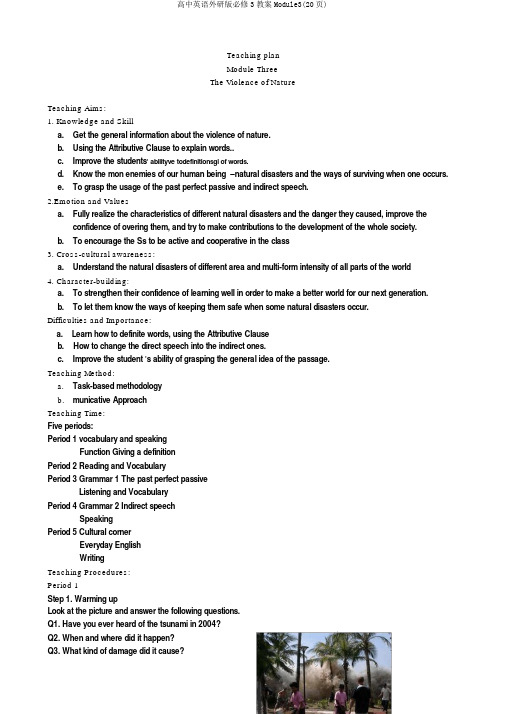
Teaching planModule ThreeThe Violence of NatureTeaching Aims:1.Knowledge and Skilla.Get the general information about the violence of nature.ing the Attributive Clause to explain words..c.Improve the students’ abilityve todefinitionsgi of words.d.Know the mon enemies of our human being –natural disasters and the ways of surviving when one occurs.e.To grasp the usage of the past perfect passive and indirect speech.2.Emotion and Valuesa.Fully realize the characteristics of different natural disasters and the danger they caused, improve theconfidence of overing them, and try to make contributions to the development of the whole society.b.To encourage the Ss to be active and cooperative in the class3.Cross-cultural awareness:a.Understand the natural disasters of different area and multi-form intensity of all parts of the world4.Character-building:a.To strengthen their confidence of learning well in order to make a better world for our next generation.b.To let them know the ways of keeping them safe when some natural disasters occur.Difficulties and Importance:a.Learn how to definite words, using the Attributive Clauseb.How to change the direct speech into the indirect ones.c.Improve the student ’s ability of grasping the general idea of the passage.Teaching Method:a.Task-based methodologyb.municative ApproachTeaching Time:Five periods:Period 1 vocabulary and speakingFunction Giving a definitionPeriod 2 Reading and VocabularyPeriod 3 Grammar 1 The past perfect passiveListening and VocabularyPeriod 4 Grammar 2 Indirect speechSpeakingPeriod 5 Cultural cornerEveryday EnglishWritingTeaching Procedures:Period 1Step 1. Warming upLook at the picture and answer the following questions.Q1. Have you ever heard of the tsunami in 2004?Q2. When and where did it happen?Q3. What kind of damage did it cause?Q4. Can you list some of other natural disasters?Q5. Tsunamis are natural occurrences. Can humanbeings stop them?Suggested answers:Q1. Yes.Q2. At the end of 2004, a massive earthquake sent tsunami smashing into Indian Ocean coastline. Many heavily populated areas disasters from it.Q3. Sri Lanka , Indonesia , Thailand , India, Malaysia and East Africa destroyed by the monster waves, causing millions of deaths.Q4. Flood, Fire, drought, landslide, earthquake, tornado, hurricane and so on.Q5. No. Tsunamis are a natural occurrence related to the processes that shape the Earth's surface — earthquakes, volcanoes, and landslides. These processes are driven by the heat escaping from the Earth and gravity, and people cannot control these underlying forces.Step 2. Vocabulary LearningMatch the words in the box with their definitions.Flood hurricane lightning thunderstorm tornado1. a lot of water in an area which is usually dry2. a very strong wind or storm3. a lot of rain falling quickly, with loud noises and flashes of light4.the flash of light which happens during a thunderstorm5. a column of air that turns very quickly.Each sentences gives a definition of a word.The Attributive Clause appears in each sentence.When we give a definit ion of a word, the Attributive Clause is usually necessary and hopeful. Welearn to use the structure“ A is B that/which”Step 4 PracticeGive definitions of the words following the pattern“ A is B that/which .”An earthquake a volcanic eruption a plane crashSuggested answers:1.An earthquake happens when the earth shakes because of movement underground.2. A volcanic eruption is that lava and ash ing out of a volcano.3. A plane crash is that a plane stopping flying and crashing into the earth.4.Which kind of these natural disasters have ever experienced? Can you describe it?5.Have you ever read a news story about one of the events? Can you describe it?6.Do you know anything about the events? For example, what causes them?Homework:1.Surf the Internet in order to have a better understanding of natural disasters.2.Preview the passage in Reading and Vocabulary.Period 2Step 1 Pre-readingRead about the Gulf Steam and check the meaning of the words:1, What is a current ?(a) A kind of electricity(b) A movement of water(c) A kind of wind2, What kind of things flow ?(a) Water(b) Time(c)Money3, If two places are on the same latitude ,they are on the same line _____(a)east/west(b)north/southSuggested answers:b. a . aa.SkimmingRead the passage quickly and silently. Find the words and expressions in the passages and match them with the definition.bury disaster feather fur occur tropical1 you can see this on an animal__________2 describing the hottest parts of the earth, north and south of the equator__________3 a terrible event_________4 you can see these on a bird_________5 to place in the ground or tomb ___________6 to happen __________Suggested answers:1. fur2. tropical3. disaster4. feather5. bury6. occurb. Detailed-reading1.How strong are tornado winds?2.What can happen to furniture when a house is destroyed by a tornado?3.How many tornadoes are there in the US every year?4.How many people died in the worst tornado of all time?5.What happens at sea during a hurricane?6.When was the worst hurricane of all time?7.Was the actor Charles Coghland killed in it?8.What happened to him after the hurricane?1.More than 400 km/h.2.It stays where it was.3.About 800.4.More than 700.5.It has huge waves.th6. 8September, 1900.7.No, he wasn ’t.8.His coffin was dropped in the sea by a hurricane and carried to Canada by the Gulf Stream.Step 3 Post-readingRead the passage again and fill in the form with suitable words.Tornado HurricaneDefinitionTimesPlacePhenomenaBad resultsThe worst example you knowSuggested answers:Tornado HurricaneDefinition A rotating column of Strong tropical storm.air from athunderstorm to theground.Times800in the US each 6 Atlantic hurricanesyear each yearPlace From Texas in the Occur in the southernsoutheast to South Atlantic Ocean,theDakota in the north Caribbean Sea and theGulf of MexicoPhenomena Have winds of more Violent winds of120than400kilometers kilometers per hour orper hour more,Bad results Pick up cars, trains Cause huge waves,and even houses and heavy rain and floodsput them down in thenext street;take thefur and feathers off;destroy houses butleave the furniturewhere it wasthThe worst example you know Occurred in 1925Occurred on the8September 1900inGalveston, Texas.Step 4 Language Explanations【条 1】occur【文原句】 Almost all of them occur in the US, in the area from Texas in the southeast to South Dakota in the north. (Page23)【点】 occur 此意“ 生” ,不及物,没有被。
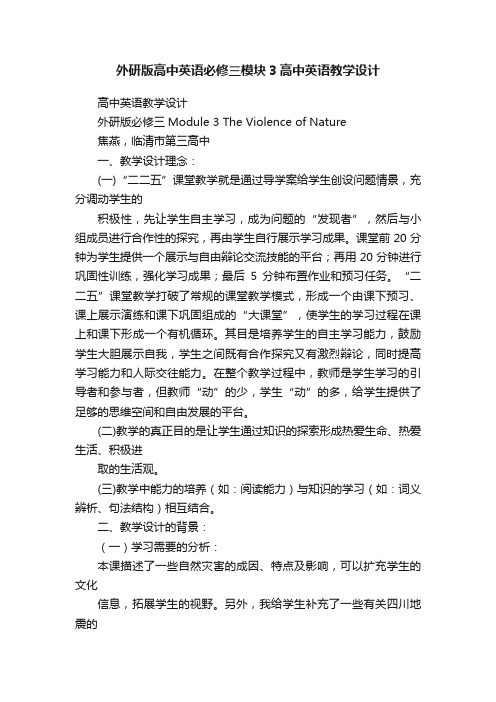
外研版高中英语必修三模块3高中英语教学设计高中英语教学设计外研版必修三Module 3 The Violence of Nature焦燕,临清市第三高中一、教学设计理念:(一)“二二五”课堂教学就是通过导学案给学生创设问题情景,充分调动学生的积极性,先让学生自主学习,成为问题的“发现者”,然后与小组成员进行合作性的探究,再由学生自行展示学习成果。
课堂前20分钟为学生提供一个展示与自由辩论交流技能的平台;再用20分钟进行巩固性训练,强化学习成果;最后5分钟布置作业和预习任务。
“二二五”课堂教学打破了常规的课堂教学模式,形成一个由课下预习、课上展示演练和课下巩固组成的“大课堂”,使学生的学习过程在课上和课下形成一个有机循环。
其目是培养学生的自主学习能力,鼓励学生大胆展示自我,学生之间既有合作探究又有激烈辩论,同时提高学习能力和人际交往能力。
在整个教学过程中,教师是学生学习的引导者和参与者,但教师“动”的少,学生“动”的多,给学生提供了足够的思维空间和自由发展的平台。
(二)教学的真正目的是让学生通过知识的探索形成热爱生命、热爱生活、积极进取的生活观。
(三)教学中能力的培养(如:阅读能力)与知识的学习(如:词义辨析、句法结构)相互结合。
二、教学设计的背景:(一)学习需要的分析:本课描述了一些自然灾害的成因、特点及影响,可以扩充学生的文化信息,拓展学生的视野。
另外,我给学生补充了一些有关四川地震的图片和英文报道,激发学生用英语获取知识和解决问题的兴趣。
(二)学习内容的分析:外研版英语教材中的每一个单元都是围绕一个独立的话题展开,包括听、说、读、写等综合技能的训练。
本单元为高一必修三第三模块,教学内容为描述自然灾害。
目的是让学生通过完成本模块的任务,能够对所学语言灵活运用,熟练掌握有关自然灾害这一话题词汇和表达句型。
并通过模块学习使学生了解地震、飓风、龙卷风等各种自然灾害的成因、过程及所造成的严重后果。
培养学生对自然科学知识的渴求,对美好生活的热爱,激发他们学好自然科学服务于生活的热情。
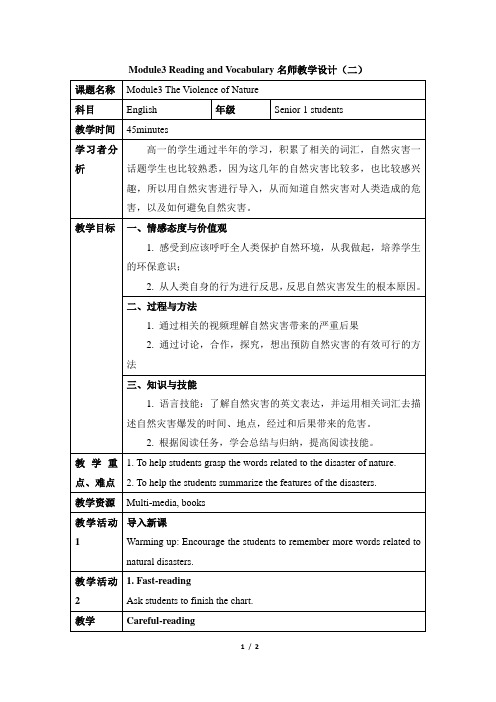
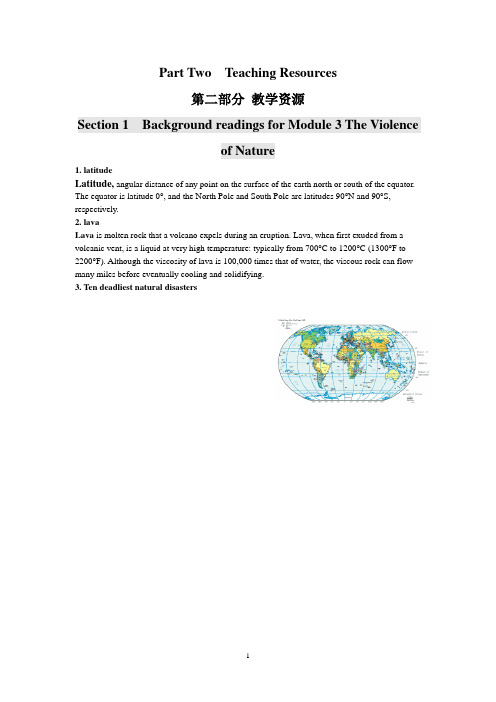
Part Two Teaching Resources第二部分教学资源Section 1 Background readings for Module 3 The Violenceof Nature1. latitudeLatitude, angular distance of any point on the surface of the earth north or south of the equator. The equator is latitude 0°, and the North Pole and South Pole are latitudes 90°N and 90°S, respectively.2. lavaLava is molten rock that a volcano expels during an eruption. Lava, when first exuded from a volcanic vent, is a liquid at very high temperature: typically from 700°C to 1200°C (1300°F to 2200°F). Although the viscosity of lava is 100,000 times that of water, the viscous rock can flow many miles before eventually cooling and solidifying.3. Ten deadliest natural disastersSection 2 The Analysis of the Difficult Sentences fromModule 3 The Violence of Nature1.They can destroy houses, but leave the furniture inside exactly where it was. 他们能完全地破坏房子, 但是房子里面的家具却能留在原处。
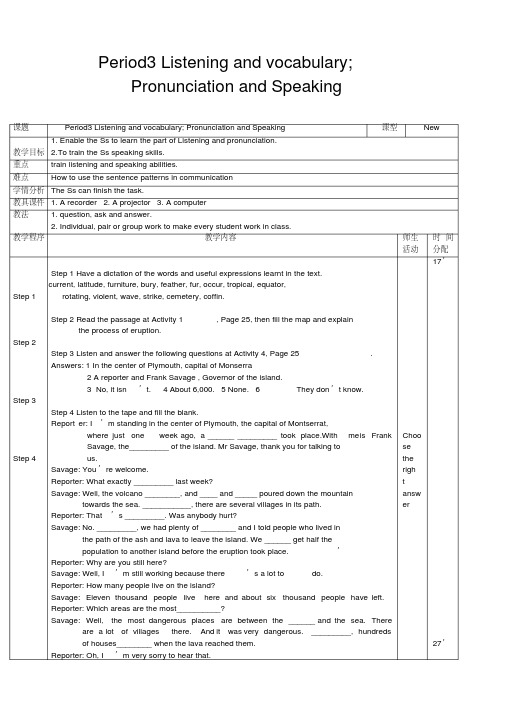
Period3 Listening and vocabulary;Pronunciation and Speaking课题Period3 Listening and vocabulary; Pronunciation and Speaking 课型New教学目标1. Enable the Ss to learn the part of Listening and pronunciation.2.To train the Ss speaking skills.重点train listening and speaking abilities.难点How to use the sentence patterns in communication学情分析The Ss can finish the task.教具课件 1. A recorder 2. A projector 3. A computer教法 1. question, ask and answer.2. Individual, pair or group work to make every student work in class.教学程序教学内容师生活动时间分配Step 1 Step 2 Step 3 Step 4 Step 1 Have a dictation of the words and useful expressions learnt in the text.current, latitude, furniture, bury, feather, fur, occur, tropical, equator,rotating, violent, wave, strike, cemetery, coffin.Step 2 Read the passage at Activity 1, Page 25, then fill the map and explain the process of eruption.Step 3 Listen and answer the following questions at Activity 4, Page 25.Answers: 1 In the center of Plymouth, capital of Monserra2 A reporter and Frank Savage , Governor of the island.3 No, it isn’t.4 About 6,000.5 None.6 They don’t know.Step 4 Listen to the tape and fill the blank.Report er: I’m standing in the center of Plymouth, the capital of Montserrat,where just one week ago, a ______ _________ took place.With me i s FrankSavage, the_________ of the island. Mr Savage, thank you for talking tous.Savage: You’re welcome.Reporter: What exactly _________ last week?Savage: Well, the volcano ________, and ____ and _____ poured down the mountain towards the sea. ___________, there are several villages in its path.Reporter: That’s _________. Was anybody hurt?Savage: No. _________, we had plenty of ________ and I told people who lived in the path of the ash and lava to leave the island. We ______ get half thepopulation to another island before the eruption took place.’ Reporter: Why are you still here?Savage: Well, I’m still working because there’s a lot to do.Reporter: How many people live on the island?Savage: Eleven thousand people live here and about six thousand people have left. Reporter: Which areas are the most__________?Savage: Well, the most dangerous places are between the ______ and the sea. There are a lot of villages there. And it was very dangerous. _________, hundreds of houses________ when the lava reached them.Reporter: Oh, I’m very sorry to hear that.Choosetherightanswer17’27’Step 5 Savage: _____________, no one was killed.Reporter: Are the houses still _____ _______?Savage: No. Fortunately, we _____ all the fires _____ quite quickly.Reporter: That’s very good news. Well, it’s a beautiful sunny day here in Plymouth.Does this mean that the danger ________?Savage: No! The volcano could erupt again! People must understand that it is still very dangerous and they can’t ________to their houses.Reporter: OK-So that’s the message from th e governor_______________. When will people be able to return home?Savage: We don’t know at the moment.____________, it won’t be too long. Reporter: Thank you for your time, Mr Savage.Savage: Thank you.Step 5 PronunciationListen and underline the words which the speaker stresses. These key words contain the main ideas.板书 Period3 Listening and vocabulary; Pronunciation and Speaking current, latitude, furniture, bury, feather, fur,occur, tropical, equator, rotating,violent, wave, strike, cemetery, coffin.教学后记So many usage for Ss.。
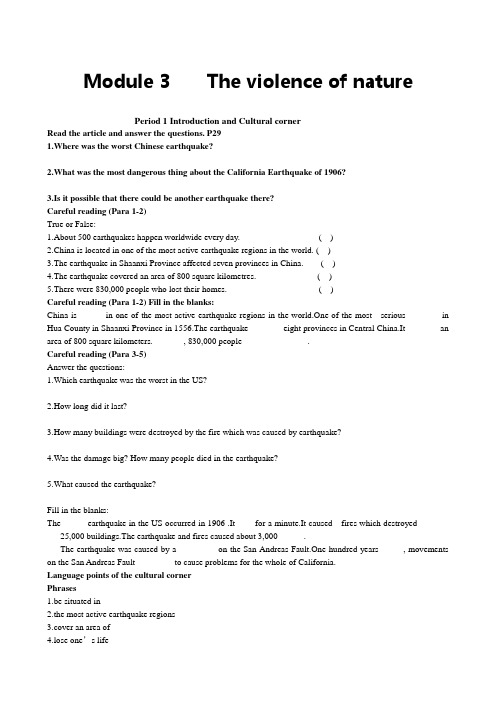
Module 3 The violence of naturePeriod 1 Introduction and Cultural cornerRead the article and answer the questions. P291.Where was the worst Chinese earthquake?2.What was the most dangerous thing about the California Earthquake of 1906?3.Is it possible that there could be another earthquake there?Careful reading (Para 1-2)True or False:1.About 500 earthquakes happen worldwide every day. ( )2.China is located in one of the most active earthquake regions in the world. ( )3.The earthquake in Shaanxi Province affected seven provinces in China. ( )4.The earthquake covered an area of 800 square kilometres. ( )5.There were 830,000 people who lost their homes. ( )Careful reading (Para 1-2) Fill in the blanks:China is______ in one of the most active earthquake regions in the world.One of the most serious _______ in Hua County in Shaanxi Province in 1556.The earthquake _______ eight provinces in Central China.It _______ an area of 800 square kilometers._______, 830,000 people _____________.Careful reading (Para 3-5)Answer the questions:1.Which earthquake was the worst in the US?2.How long did it last?3.How many buildings were destroyed by the fire which was caused by earthquake?4.Was the damage big? How many people died in the earthquake?5.What caused the earthquake?Fill in the blanks:The _____ earthquake in the US occurred in 1906 .It ____for a minute.It caused fires which destroyed __ ____ ___25,000 buildings.The earthquake and fires caused about 3,000______.The earthquake was caused by a _______ on the San Andreas Fault.One hundred years _____, movements on the San Andreas Fault ________ to cause problems for the whole of California.Language points of the cultural cornerPhrases1.be situated in2.the most active earthquake regions3.cover an area of4.lose one’s lifest for6.the worst natural disaster7.do damage8.make sb homeless9.in the whole of10.be caused bySentences1.About 400 earthquake occur worldwide every day, more than a hundred thousand in a year.(para.1)occur: vi.to happen 发生(不用于被动语态)occur---occurred---occurred---occurring他告诉我那事故是怎样发生的。

Module3 Grammar(1)精品教案Teaching contents:The past perfect passiveTeaching important points:Know the basic forms of passive voiceTeaching difficult points:How to use the past perfect passive correctlyTeaching methods:explaining and practicingTeaching procedures:Step 1 Self-study: Finish the exercises of grammar on page 32 of 世纪金榜Step 2 Presentation: page 241 what can you see from the following sentences?1 By the time the tornado ended, more than 700 people had been killed.2 Coghlan traveled back to Canada after he had been buried in Texas.3 My computer had been all right till last week.动作在过去某一时刻之前已经完成,且谓语动词与发出这一动作的主语存在被动关系。
句中常用by, before, until, when等词引导时间状语。
2 Finish the exercise at Activity 2, Page 24.Answers: 1 saw, had disappeared 2 returned, found, had been buried3 arrived, had taken4 left, had finished 5. tried, passed当从句由after, before, when或as soon as引导时,主句和从句都可以用一般过去时。

Module 3 The Violence of Nature本单元以“自然灾害”(The violence of nature)为话题,旨在通过单元教学,让学生运用书中的Useful expressions编对话,描述人物,事件和人物的感情,了解人们在自然灾害中的经历、感受,提高学生的自我保护意识;培养学生对定语从句的运用能力,词汇部分训练学生在语境中理解词汇的能力,学习对词语进行解释,以及如何运用useful expressions暗示之后的语言内容。
本单元的话题是“自然灾害”,其中包括“龙卷风”、“飓风”、“火山爆发”、“地震”、“洪水”等。
【总体目标】Learn to use the Indirect Speech and learn to use the Past Perfect Passive.Write about a natural disaster.Write a passage using everyday English that indicate the good or bad things to happen.Learn to give definitions of a word with Attribute Clause.【词汇】1.基础词汇:disaster, flood, hurricane, lightening, thunderstorm, tornado, column, experience, cause, current, furniture, bury, feather, fur, occur, violent, wave, strike, cemetery, rotating, coffin, previous, eruption, ruin, ash, lava, tidal, volcano, possibility, earthquake, terrifying, luckily, thankfully, hopefully, sadly, fortunately, warning, worldwide, active, damage.2. 认读词汇:latitude, tropical, equator.3. 词组:per hour, pick up, put…down, take off, on averag e, tropical storms, in a population of, tiny island, tidal wave, pour down, set fire, volcanic eruption, take place, move from side to side, be windy, be situated in, Central China, in all, lose one’s life, do the most damage, a total of, affected areas, p ush…out of, fall down, medical care【句子】1.They can destroy houses, but leave the furniture inside exactly where it was.2.On average, there are 800 tornadoes in the US each year, causing about 80 deaths and 1,500 injuries.3.By the time it ended, more than 700 people had been killed and 2,700 had been injured.4.The disaster killed 6,000 people in a population of 37,000 and destroyed 3,600 buildings.5.When the lava reached the sea, there was the possibility of a huge tidal wave which could flood half the island.6. Fires caused by the California Earthquake did the most damage.7. The earthquake has left tens of thousands of people homeless.8. My family had just finished breakfast when the house started shaking and we heard a loud noise.9. At night it is very cold in the region with temperatures falling结构:The Past Perfect Passive Sb had done sth. Sth had been done.Indirect Speech 1. Statements “I’m still working because there is a lot to do.” he said. He said that he was still working because there was a lot to do.2. Questions “Does this mean that the danger is over?” he asked. He asked if this meant that the danger was over. “When will people be able to return home?” asked he. He asked when peoplea. Learn how to definite words, using the Attributive Clauseb.How to change the direct speech into the indirect ones. c. Improve the student’s ability of grasping the general idea of the passage.多媒体课件辅助。
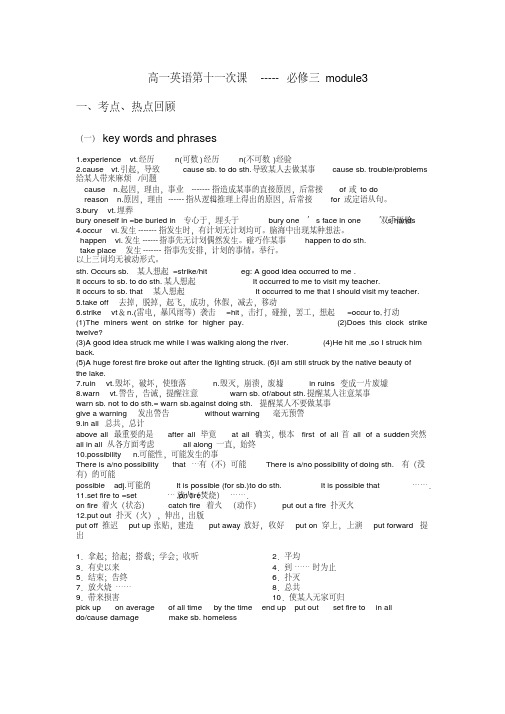
高一英语第十一次课----- 必修三module3一、考点、热点回顾(一)key words and phrases1.experience vt.经历n(可数)经历n(不可数)经验2.cause vt.引起,导致cause sb. to do sth.导致某人去做某事cause sb. trouble/problems 给某人带来麻烦/问题cause n.起因,理由,事业-------指造成某事的直接原因,后常接of或to doreason n.原因,理由------指从逻辑推理上得出的原因,后常接for或定语从句。
3.bury vt.埋葬bury oneself in =be buried in 专心于,埋头于bury one’s face in one’s hands双手捂脸4.occur vi.发生-------指发生时,有计划无计划均可。
脑海中出现某种想法。
happen vi.发生------指事先无计划偶然发生。
碰巧作某事happen to do sth.take place 发生-------指事先安排,计划的事情。
举行。
以上三词均无被动形式。
sth. Occurs sb. 某人想起=strike/hit eg: A good idea occurred to me .It occurs to sb. to do sth.某人想起It occurred to me to visit my teacher.某人想起It occurred to me that I should visit my teacher.It occurs to sb. that…5.take off 去掉,脱掉,起飞,成功,休假,减去,移动6.strike vt&n.(雷电,暴风雨等)袭击=hit,击打,碰撞,罢工,想起=occur to,打动(1)The miners went on strike for higher pay. (2)Does this clock strike twelve?(3)A good idea struck me while I was walking along the river. (4)He hit me ,so I struck him back.(5)A huge forest fire broke out after the lighting struck. (6)I am still struck by the native beauty ofthe lake.7.ruin vt.毁坏,破坏,使堕落n.毁灭,崩溃,废墟in ruins 变成一片废墟8.warn vt.警告,告诫,提醒注意warn sb. of/about sth.提醒某人注意某事warn sb. not to do sth.= warn sb.against doing sth. 提醒某人不要做某事give a warning 发出警告without warning 毫无预警9.in all 总共,总计above all 最重要的是after all 毕竟at all 确实,根本first of all首all of a sudden突然all in all从各方面考虑all along一直,始终10.possibility n.可能性,可能发生的事There is a/no possibility that… 有(不)可能There is a/no possibility of doing sth.有(没有)的可能possible adj.可能的It is possible (for sb.)to do sth. It is possible that…….放火(焚烧)…….11.set fire to =set….on fireon fire着火(状态)catch fire 着火(动作)put out a fire扑灭火12.put out 扑灭(火),伸出,出版put off推迟put up张贴,建造put away放好,收好put on 穿上,上演put forward 提出1.拿起;拾起;搭载;学会;收听2.平均3.有史以来4.到……时为止5.结束;告终6.扑灭7.放火烧…… 8.总共9.带来损害10.使某人无家可归pick up on average of all time by the time end up put out set fire to in alldo/cause damage make sb. homeless选词填空in all,set fire to,by the time,pick up,on average1. __________ you arrive, I will have left.2.__________, I spend two hours doing my homework every day.3.Sorry, I have to go to _______ my son from school.4.How much money does he owe you ______?5.Have the police found out who ________ the building?(二)Language PointsOn average, there are800 trnadoes in the US each year, causing about 80 deaths and 1,500 injuries.现在分词短语作结果状语The fire burned for 3 days, destroying a total of 25,000 buildings.现在分词短语作结果状语表自然而然的结果。
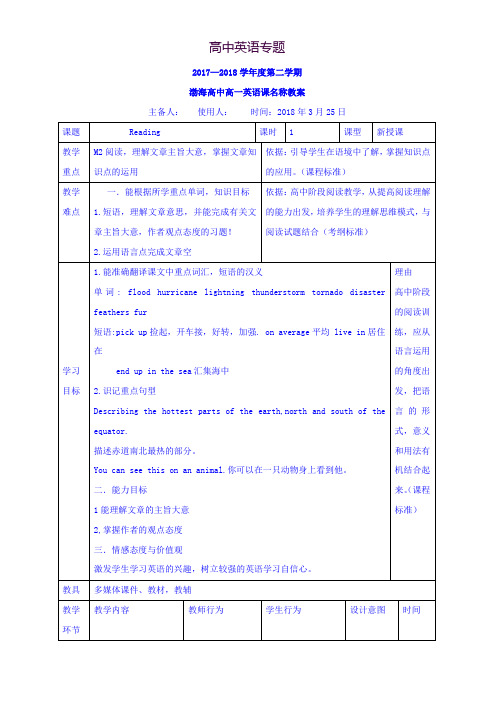

Module3 Reading and vocabulary 精品教案Teaching contents: What is a Tornado?Teaching important points: Read to get certain information about what is a tornado?What is a hurricane? And an extraordinary event Teaching difficult points: How to help students improve their reading ability Teaching methods: Listening, reading and practicingTeaching procedures:Step 1 RevisionAsk three or four students to read the word list and other students to correct their wrong pronunciations.Step 1 Presentation.Student A: reporter from one of the newspapers.Student B: interviewee.Now you are working on a special report about disasters, you need to interview some peopleQuestions like these:1 Have you ever experienced (a flood, a tornado a thunderstorm, a hurricane)?2 Do you know anyone who has experienced one of the events?3 Have you ever read a news story about one of the events? Can you describe it?4 Do you know anything about the events? For example, what causes them?Step 2 Read the Gulf Stream and check the meaning of the words.1. What is a current?A. A kind of electricityB. A movement of waterC. A kind of wind2. What kind of things flow?A. WaterB. TimeC. Money3. If two places are on the same latitude, they are on the same line______.A. east/westB. north/southStep 3 Fast-readingRead the passage, then finish the exercise at Activity 2, page 22.1. More than 400 Km/h.2. It stays where it was.3. About 800.4. More than 700.5. It has huge waves.6. 8th September, 19007. No, h e wasn’t8. His coffin was dropped in the sea by a hurricane and carried to Canada by the Gulf Stream.Step 4 Detailed-reading (True or False)1 All tornadoes have winds of more than 400 kilometres per hour.2 There are more tornadoes occurring in the US than in other parts of the world.3 Tornadoes can’t destroy furniture because they are not violent enough.4 In the US, there are usually about 80 people killed in tornadoes every year.5 The worst tornado in history killed at least 700 people6 Every year there are six Atlantic hurricanes.7 Both the worst tornado and the worst hurricane occurred in the US.8 The worst hurricane of all time killed about one-sixth of the population in the US.9 Charles Coghlan didn't become famous until he moved to New York.10 Coghlan’s coffin was destroyed by the 1900 Galveston hurricane.11 It was only because of the hurricane that Coghlan’s body could travel back to Canada.Step 5 Fill in the form.Step 6 Homework: Collect more information on Internet about one of the disasters.。
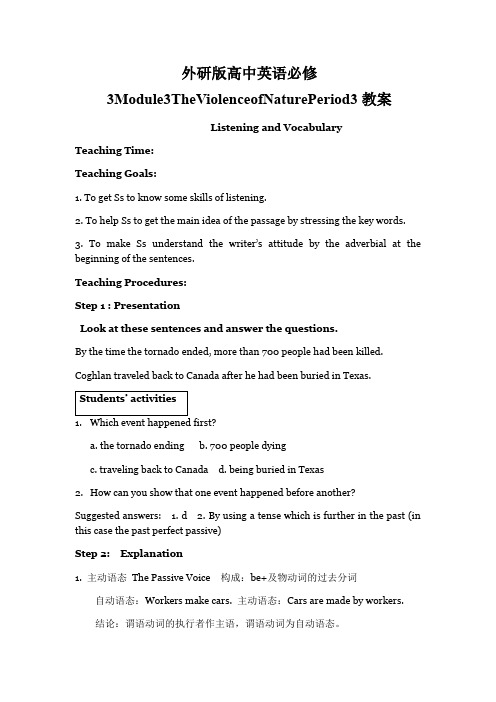
外研版高中英语必修3Module3TheViolenceofNaturePeriod3教案Listening and VocabularyTeaching Time:Teaching Goals:1. To get Ss to know some skills of listening.2. To help Ss to get the main idea of the passage by stressing the key words.3. To make Ss understand the writer’s attitude by the adverbial at the beginning of the sentences.Teaching Procedures:Step 1 : PresentationLook at these sentences and answer the questions.By the time the tornado ended, more than 700 people had been killed.Coghlan traveled back to Canada after he had been buried in Texas.a. the tornado endingb. 700 people dyingc. traveling back to Canadad. being buried in Texas2.How can you show that one event happened before another?Suggested answers: 1. d 2. By using a tense which is further in the past (in this case the past perfect passive)Step 2: Explanation1. 主动语态The Passive Voice 构成:be+及物动词的过去分词自动语态:Workers make cars. 主动语态:Cars are made by workers.结论:谓语动词的执行者作主语,谓语动词为自动语态。
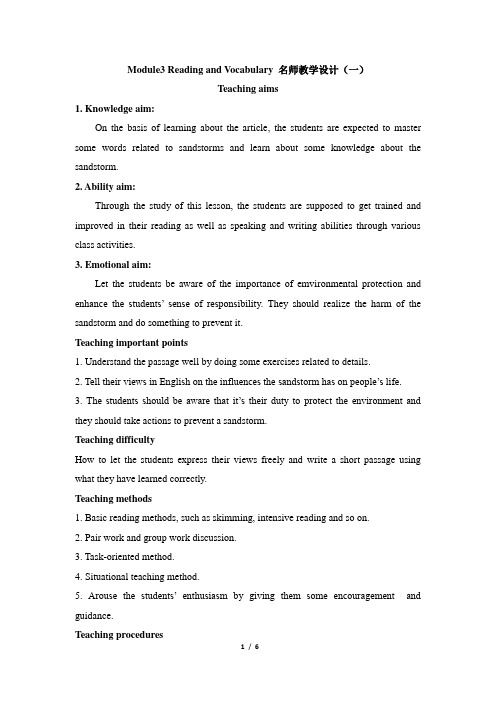
Module3 Reading and Vocabulary 名师教学设计(一)Teaching aims1. Knowledge aim:On the basis of learning about the article, the students are expected to master some words related to sandstorms and learn about some knowledge about the sandstorm.2. Ability aim:Through the study of this lesson, the students are supposed to get trained and improved in their reading as well as speaking and writing abilities through various class activities.3. Emotional aim:Let the students be aware of the importance of emvironmental protection and enhance the students’ sense of responsibility. They should realize the harm of the sandstorm and do something to prevent it.Teaching important points1. Understand the passage well by doing some exercises related to details.2. Tell their views in English on the influences the sandstorm has on people’s life.3. The students should be aware that it’s their duty to protect the environment and they should take actions to prevent a sandstorm.Teaching difficultyHow to let the students express their views freely and write a short passage using what they have learned correctly.Teaching methods1. Basic reading methods, such as skimming, intensive reading and so on.2. Pair work and group work discussion.3. Task-oriented method.4. Situational teaching method.5. Arouse the students’ enthusiasm by giving them some encouragement and guidance.Teaching proceduresLearning aims1. All of the students can master the key words and expressions about sandstorms like frightening, bury, dig up and so on.2. Most of the students can tell or write something about “what is a sandstorm, what it is like, the reason for it and how to prevent it” after reading the passage.3. Most of the students can understand what the teacher say during the class.4. All of them can realize the importance of protecting the environment.Task 1 (group work): Collect some pictures about sandstorms and describe what is happening on the picture with one or two sentences.An example: A car which is covered with thick dust is moving very slowly in a sandstorm.Purpose of this part:To get familiar with scenes of sandstorms and arouse their interests in sandstorms. Task 2: Fill in the blanks with the following words.sandstorm cycle desertification dust frightening forecastsurvive strength maskWhen farmlands change into desert, ____________ happens, which is a major cause of a ___________. The ____________ of the wind is amazing, and it’s _____________ to be in a sandstorm. The sand and ________ cover the whole world. You’d better wear a _________ if you walk or _________ to work. If not, you’ll find it difficult to ____________. It’s a good idea to check the weather __________before you go out.Purpose of this part:To preview some new words and prepare for readingStep1. Lead-inShow them two pictures, enjoy the first video and ask some questions related to sandstorms to warm up.1. If you have a chance to choose where to live, which place would you like to choose?2. Why the sandstorm happens?3. How to prevent it?Purpose of this part:To arouse the students interests in knowing about sandstorms and prepare them for reading.Step2. Reading for structure and main idea.Task 3: Divide the passage into 4 parts and match with their main ideas.Part one ( Para 1) ________Part two ( Para 2&3 ) ________Part three ( Para 4&5) ________Part four ( Para6 ) ________A. The influence of a sandstorm and suggestions when you are in a sandstorm.B. The measure to prevent sandstorms.C. The description and the causes of sandstorms.D. The sandstorm is a major disaster in Asia.Purpose of this part:To know how to get the main idea of a passage according to the topic sentences.Step3. Reading for information(分层阅读)Task 4: Read part 1 and part 2 and finish the following exercises.1). Fill in the blanks.Scientists have tried a lot of ways _____ solve sandstorms which are a major disaster in Asia. The dry and strong winds are often _____ thick ______ you can’t see the sun, and it is strong _________ _______ move sand dunes. Ren Jianbo described a terrible sandstorm ________ he experienced. He said that _______ ______ ______ _______was very terrible and there was nothing _____ ______ _______.2). True or false questions.A. Sandstorms mainly happen in Asia countries. ( )B. Sandstorms in China have increased in recent years. ( )C. The sandstorm center in Central Asia includes southwest China. ( )D. Ren Jianbo was caught in a sandstorm in the city. ( )3). What does “it” refer to in the last sentence but one of paragraph2?A. There is nothing to be done.B. situationC. to have been caught in a sandstormD. a terrible experience4). Which one is not the cause of desertification?A. climate changesB. cutting done treesC. digging up grassD. strong windsPurpose of this part:To develop the students’ ability in dealing with detailed questions in reading through different kinds of exercises and improve their skills in dealing with reading problems. Task 5: Read part 3 and part 4 to fill in the form.Purpose of this part:To get the key views of the two parts with some useful expressions.Step4: Having a review about language points and passage structureTask 6: Finish the structure with useful expressions in the text.Purpose of this part:To have a review the content of the passage and to revise some useful phrases which can be used in step 6.Step5. Deeper thinkingWatch the second video about sandstorms.Purpose of this part:To show a short video about the causes, influences and measures to prevent a sandstorm and let them have a deeper impression of sandstorms.To get more information about sandstorms for the discussion.Step6. Discussion(Group work)1. The causes of desertification:2. The influences:…cover the world..people’s life(study , work, health.. )..…the traffic…3. The tips when caught in a sandstorm:1). Pay attention to ________________________________________________.2). You are supposed to_____________________________________________.3). You’d better___________________________________________________.4). It’s a good idea to ______________________________________________.…happen as a result of.. , which is caused by…; …also lead to … …is another reason, which can cause … to ……4. The measures to prevent sandstorms: The government:①②…The citizens:①②…Purpose of this part:To make the students aware of the importance of environmental protection and let the students know it’s their duty to let more people know about sandstorms.To show the students how to make a panel about environmental protection and encourage them to advertise something in this way.Step7. HomeworkTo write a short passage about sandstorms, including the causes, influences, and measures. (about 80words).Purpose of this part:To use what they have learned well.To develop their ability in integrating information.。
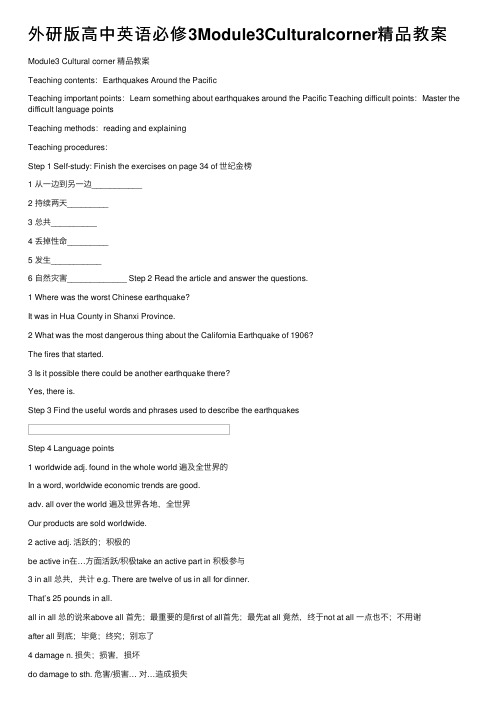
外研版⾼中英语必修3Module3Culturalcorner精品教案Module3 Cultural corner 精品教案Teaching contents:Earthquakes Around the PacificTeaching important points:Learn something about earthquakes around the Pacific Teaching difficult points:Master the difficult language pointsTeaching methods:reading and explainingTeaching procedures:Step 1 Self-study: Finish the exercises on page 34 of 世纪⾦榜1 从⼀边到另⼀边___________2 持续两天_________3 总共__________4 丢掉性命_________5 发⽣___________6 ⾃然灾害_____________ Step 2 Read the article and answer the questions.1 Where was the worst Chinese earthquake?It was in Hua County in Shanxi Province.2 What was the most dangerous thing about the California Earthquake of 1906?The fires that started.3 Is it possible there could be another earthquake there?Yes, there is.Step 3 Find the useful words and phrases used to describe the earthquakesStep 4 Language points1 worldwide adj. found in the whole world 遍及全世界的In a word, worldwide economic trends are good.adv. all over the world 遍及世界各地,全世界Our products are sold worldwide.2 active adj. 活跃的;积极的be active in在…⽅⾯活跃/积极take an active part in 积极参与3 in all 总共,共计 e.g. There are twelve of us in all for dinner.That’s 25 pounds in all.all in all 总的说来above all ⾸先;最重要的是first of all⾸先;最先at all 竟然,终于not at all ⼀点也不;不⽤谢after all 到底;毕竟;终究;别忘了4 damage n. 损失;损害,损坏do damage to sth. 危害/损害… 对…造成损失e.g. The storm did a lot of damage to the crops.Step 5 Exercises1 We were fifteen____________.我们⼀共⼗五个⼈。
高一英语第十一次课----- 必修三module3一、考点、热点回顾(一)key words and phrases1.experience vt.经历n(可数)经历n(不可数)经验2.cause vt.引起,导致cause sb. to do sth.导致某人去做某事cause sb. trouble/problems 给某人带来麻烦/问题cause n.起因,理由,事业-------指造成某事的直接原因,后常接of或to doreason n.原因,理由------指从逻辑推理上得出的原因,后常接for或定语从句。
3.bury vt.埋葬bury oneself in =be buried in 专心于,埋头于bury one’s face in one’s hands 双手捂脸4.occur vi.发生-------指发生时,有计划无计划均可。
脑海中出现某种想法。
happen vi.发生------指事先无计划偶然发生。
碰巧作某事happen to do sth.take place 发生-------指事先安排,计划的事情。
举行。
以上三词均无被动形式。
sth. Occurs sb. 某人想起=strike/hit eg: A good idea occurred to me .It occurs to sb. to do sth.某人想起It occurred to me to visit my teacher.It occurs to sb. that…某人想起It occurred to me that I should visit my teacher.5.take off 去掉,脱掉,起飞,成功,休假,减去,移动6.strike vt&n.(雷电,暴风雨等)袭击=hit,击打,碰撞,罢工,想起=occur to,打动(1)The miners went on strike for higher pay. (2)Does this clock strike twelve?(3)A good idea struck me while I was walking along the river. (4)He hit me ,so I struck him back.(5)A huge forest fire broke out after the lighting struck. (6)I am still struck by the native beauty of the lake.7.ruin vt.毁坏,破坏,使堕落n.毁灭,崩溃,废墟in ruins 变成一片废墟8.warn vt.警告,告诫,提醒注意warn sb. of/about sth.提醒某人注意某事warn sb. not to do sth.= warn sb.against doing sth. 提醒某人不要做某事give a warning 发出警告without warning 毫无预警9.in all 总共,总计above all 最重要的是after all 毕竟at all 确实,根本first of all首all of a sudden突然all in all从各方面考虑all along一直,始终10.possibility n.可能性,可能发生的事There is a/no possibility that… 有(不)可能There is a/no possibility of doing sth.有(没有)的可能possible adj.可能的It is possible (for sb.)to do sth. It is possible that…….11.set fire to =set….on fire 放火(焚烧)…….on fire着火(状态)catch fire 着火(动作)put out a fire扑灭火12.put out 扑灭(火),伸出,出版put off推迟put up张贴,建造put away放好,收好put on 穿上,上演put forward 提出1.拿起;拾起;搭载;学会;收听2.平均3.有史以来4.到……时为止5.结束;告终6.扑灭7.放火烧…… 8.总共9.带来损害10.使某人无家可归pick up on average of all time by the time end up put out set fire to in alldo/cause damage make sb. homeless选词填空in all,set fire to,by the time,pick up,on average1. __________ you arrive, I will have left.2.__________, I spend two hours doing my homework every day.3.Sorry, I have to go to _______ my son from school.4.How much money does he owe you ______?5.Have the police found out who ________ the building?(二)Language PointsOn average, there are800 trnadoes in the US each year, causing about 80 deaths and 1,500 injuries.现在分词短语作结果状语The fire burned for 3 days, destroying a total of 25,000 buildings.现在分词短语作结果状语表自然而然的结果。
不定式短语作结果状语表意象不到的结果。
常用only/just+todoHe hurried to the station, only to find the train had left.Grammar过去完成时的被动语态1. The boy _ __ streets without pay in the old days.A. was made to cleanB. made cleanC. made to cleanD. was made clean2. These children ___ _ dance.A. were seen toB. were seen forC. were seenD. saw to3.The monkey was seen ____ _ off the tree.A. jumpB. jumpsC. jumpedD. to jump4.An accident __ __ on this road last week.A. has been happenedB. was happenedC. is happenedD. happened5. The apple _ __ very sweet.A. is tastedB. tasteC. tastesD. are tasting6. You _ more beautiful in the light blue shirt.A. seeB. watchC. lookD. look at7. Old people must be looked after well and _ __ politely.A. speak toB. spokenC. speakD. spoken to8. Old people must _ __.A. look after wellB. be looked well afterC. looked well afterD. be looked after well9. Newly-born babies _ _ in hospital.A. are taken good careB. are taken good care ofC. take good care ofD. take good care10. —How clean the window is!—Yes. It just now.A. has been cleanedB. was cleanedC. is cleanedD. will be cleaned间接引语直接引语与间接引语的转换1.The hotel manager said to me , “You have to stay in the hotel because this is the start of a hurricane.”The hotel manager said to me ____________________________________________.2.He said , “ I saw the roof of the house across the road disappear a moment ago.”He said ______________________________________________________________.3.A scie ntist said, “ Volcanic eruptions don’t happened very often on this island.A scientist said ________________________________________________________.4.The journalist said, “ The residents will travel back to the island when the danger is over.The journalist said _____________________________________________________.5.He said, “ Half the residents left the island last week.”He said _____________________________________________________________.6.He asked, “Does this mean that the danger is over?”He asked ____________________________________________________________?7.He asked her, “May I go there now?”He asked _____________________________________________________________?8.He asked me, “What were you doing when the earthquake happened?”He asked me _________________________________________________________?9.He asked the governor, “Can we go back to our homes tomorrow?”He asked the governor __________________________________________________?10.The tourist asked the local people, “ Had the fi re been put out before firefighter arrived?The tourist asked the local people _________________________________________?11.I said to him,“Do it at once.” I______(said)(told)him to do it at once.12.He said to me,“Shut the window,please.” He asked m e______(shut)(to shut)the window.13.I said to him,“Don’t cry!” I told him______(to not cry)(not to cry)(cry not).14.The doctor said to me,“Don’t smoke.” The doctor told/advised me______(not to smoke)(not smoke)(did not smoke).15.I said to him yesterday,“Please come early tomorrow morning.”Yesterday I______(told)(asked)(said)him to come early______(the next)(this)(that)morning.二、典型例题(一)单项选择1.[2010·天津卷] It rained heavily in the south,________ serious flooding in several provinces.A. causedB. having causedC. causingD. to cause【解析】C现在分词作状语,起补充说明的作用。